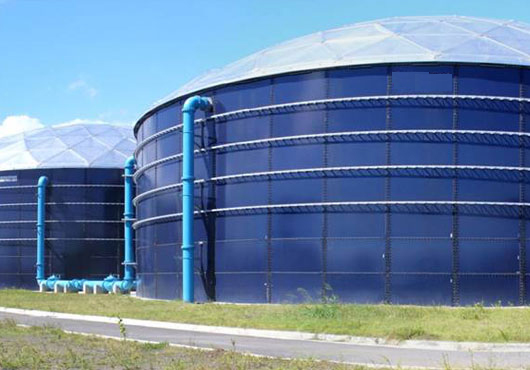Industrial Glass Fused Steel Tanks
Glass Fused Steel (GFS) is the ultimate tank solution which utilizes a proven product with significant advantages, also known as Glass Lined Steel Tanks (GLS Tanks). For applications in which polylined tanks can be unsuitable or the size of the tank exceeds 2.5 Megalitres we suggest GFS tanks.
- As strong and flexible as steel.
- Colour fast / UV Stable.
- High performance and hard wearing.
- Inert Silica Glass.
What is Glass Fused To Steel (GFS)?
A special tank finish is Glass Fused to Steel (Glass Lined Steel Tanks). The power and the durability of stain combined with the corrosion resistance of glass are two components fused together to achieve the best properties of both. Glass Fused to Steel will provide trouble-free operation in harsh environments, for years on both internal and external surfaces.
Glass Fused Steel Tank (GFS Tank) Benefits :
In combination with its modular design and construction concept SD Enviro’s Glass Fused to Steel Tanks finish offers a range of benefits including customers:
- Long Life Span
- Low Capital Cost
- Low Maintenance Costs
- Rapid Installation Times
- Economic Worldwide Shipments
- Flexibility to Re-model, Extend and Re-site
- Optimum Corrosion Resistance


Glass Fused Steel Tank (GFS Tank) Erection:
A special jacking system includes the installation of the fused-to-steel glass tank in the field. When the initial sheet is placed into or designed using the glass covered bolted stainless steel floor system, it is built on the jacks on the top ring of the tank. This then erects the tank’s roof and seals the ring and the roof.
The sheets are bolted together and a specially formulated urethane sealant is added between seams to each additional ring underneath the top ring.
Every construction is carried out on the land, ensuring a safe, quick and efficient construction environment. GFS Tanks can usually be done within a week or two that saves the owner substantial costs when on-site labor salaries are used.
Our construction workers are trained to maintain the same quality assurance in the field during the installation process. For the building of these GFS tanks, only fully trained erectors are used.
Glass Fused Steel vs Concrete Tanks :
GFS Tanks
- Lower capital cost
- Manufacturing in a licensed manufacturing plant is completed.
- Production in the factory is finished–site clearing and levelling is reduced
- Proven, excellent life cycle costing.
- The factory coating is permanent, waterproof and chemical and mechanical. There is no need for re-coating.
- Designed with jacks and limited equipment at ground level.
- However, in the event of damage, panels can be replaced for a long, long-life coating.
- Keeps a value of money and can be transported with minimum scrap.
- Smooth glass surface hygienic, no effect on the contents held.
- More chlorine and chloride resistant glass coating.
- Less reliable on the environment to develop successfully.
- Without changing footprint, so good for production, tanks can be enlarged vertically.
- The tank kits are easy to transport and stack in tight places.
- Facily adaptable to add fogs, mixing systems and equipment by using bolted connections.
- Foundation for all types of soil.
- Easily wiped out or washed off graffiti and debris.
- Esthetically good Not fading, scraping or dyeing that is perfect for projects in the community.
- A selection of colors to meet environmental or esthetic demands.
Concrete Tanks
- Higher capital cost
- Field Generated variables like worker experience that are unregulated
- Field Produced with wide areas and required clearing-high cost of capital
- Construction specific, unknown life cycle costing.
- Betons are permeable–coatings, continuous maintenance and costs are required.
- Requires large amounts of equipment and installation and height work.
- Cracking faults are hard to resolve on a longer term basis.
- Significant costs of demolition. Not reusable or relocable.
- Rough surface rough causes build up soil.
- Concrete, coatings and insulation is very difficult for chlorine treatment.
- The premature drying and cracking of the construction at high temperatures can result.
- Not expandable-Significant engineering is needed to increase efficiency.
- For projects in tight places, confined and challenging.
- Significant tank and accessories engineering required.
- Weak soils and high water. High water.
- Beton needs to be repaint, hard to clean.
- Chalking and potential fading–exterior coating to improve the concrete look.
- The aesthetics of concrete are minimal.
- Concrete, coatings and insulation is very difficult for chlorine treatment.
We are Glass Fused Steel Tank (GFS Tanks) Manufacturer and Suppliers and having happy customers spread across Hyderabad, Pune, Bangalore, Chennai, Coimbatore, NCR, Mumbai, Kolkata, Trivendrum, Kochi, Delhi, India, Sri Lanka, Nepal, Bangladesh, Bhutan, Vietnam, Myanmar, Cambodia, Thailand, Kuwait, Bahrain, Qatar, Saudi Arabia, etc.
Glass Fused Steel Tank Applications:
You can easily comprehend that the glass fused to steel tank has a broad array of uses in water and waste water treatment programs. The stored media could be in Agricultural Water Storage, Anaerobic Digester, Dry Bulk Storage, Fire Water Storage Tanks, Industrial Wastewater Treatment, Leachate Treatment, Drinking Water Storage Tanks, Municipal Sewage etc..

